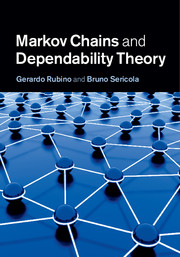Book contents
- Frontmatter
- Contents
- 1 Introduction
- 2 Discrete-time Markov chains
- 3 Continuous-time Markov chains
- 4 State aggregation
- 5 Sojourn times in subsets of states
- 6 Occupation times of subsets of states – interval availability
- 7 Linear combination of occupation times – performability
- 8 Stationarity detection
- 9 Simulation techniques
- 10 Bounding techniques
- References
- Index
10 - Bounding techniques
Published online by Cambridge University Press: 05 July 2014
- Frontmatter
- Contents
- 1 Introduction
- 2 Discrete-time Markov chains
- 3 Continuous-time Markov chains
- 4 State aggregation
- 5 Sojourn times in subsets of states
- 6 Occupation times of subsets of states – interval availability
- 7 Linear combination of occupation times – performability
- 8 Stationarity detection
- 9 Simulation techniques
- 10 Bounding techniques
- References
- Index
Summary
One of the approaches that can be followed when dealing with very large models is to try to compute the bounds of the metrics of interest. This chapter describes bounding procedures that can be used to bound two important dependability metrics. We are concerned with highly dependable systems; the bounding techniques described here are designed to be efficient in that context.
First, we address the situation where the states of the model are weighted by real numbers, the model (the Markov chain) is irreducible and the metric is the asymptotic mean reward. The most important example of a metric of this type in dependability is the asymptotic availability, but many other metrics also fit this framework, for instance, the mean number of customers in a queuing system, or in part of a queuing network (in this case, the techniques must be considered in light traffic conditions, the equivalent to a highly dependable system in this queuing situation).
Second, we consider the evaluation of the Mean Time To Failure, that is, of the expectation of the delay from the initial instant to the occurrence of the first system's failure. The situation is that of a chain where all states but one are transient and the remaining state is absorbing; the MTTF corresponds to the mean absorption time of the chain.
- Type
- Chapter
- Information
- Markov Chains and Dependability Theory , pp. 230 - 270Publisher: Cambridge University PressPrint publication year: 2014



